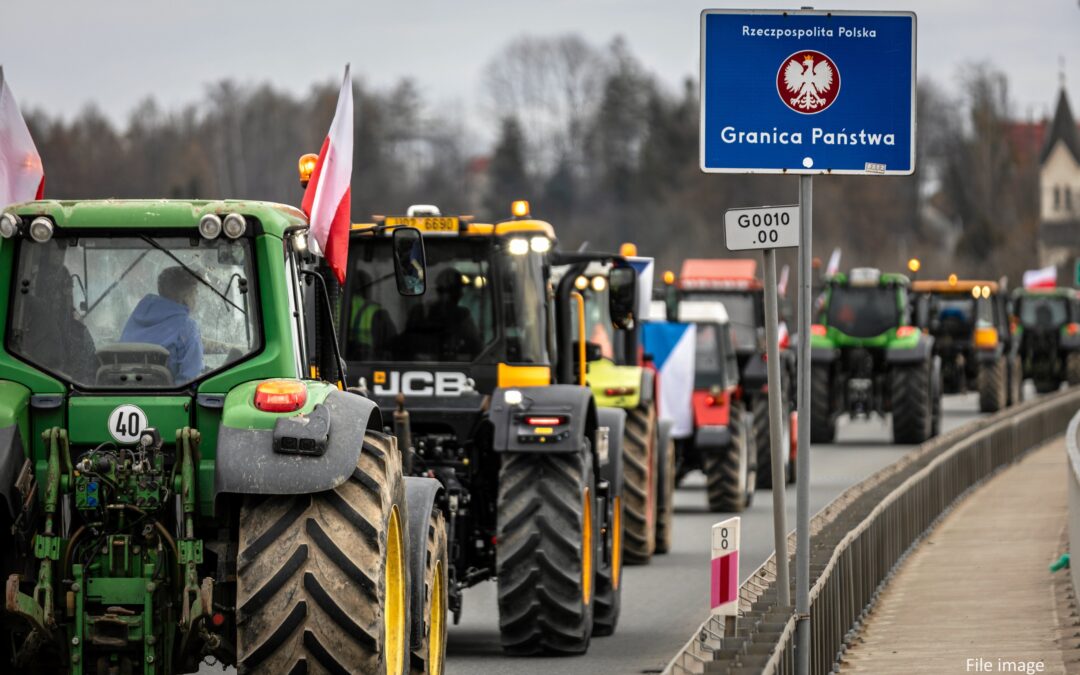Polish farmers have today begun blocking a border crossing with Slovakia, which they say is being used as a route to bring produce from Ukraine into Poland, bypassing the blockade of the Ukrainian border that began earlier this month.
Later this week, farmers are also planning to block the border with Lithuania, which, like Slovakia, is a fellow EU member state and part of the European free-movement Schengen Zone.
Meanwhile, Poland’s main opposition party, the national-conservative Law and Justice (PiS), has called on the government to introduce an immediate embargo on Ukrainian goods, despite the fact that it would be a violation of EU trade rules.
Protest rolników na granicy polsko-słowackiej w Barwinku https://t.co/h5VEpiduC9
— terazKrosno.pl (@terazKrosno) February 26, 2024
Around 10 a.m. on Monday, a group of farmers driving dozens of tractors appeared on the highway that leads to the border crossing with Slovakia in the village of Barwinek in southeast Poland, reported broadcaster TVP.
Initially, they completely blocked the crossing for an hour before subsequently only allowing through one truck per hour in both directions, resulting in queues several kilometres long on each side of the border. Passenger vehicles are being allowed through.
“We will verify trucks…[to see] whether they are carrying grain or not,” one of the protest’s co-organisers, Maciej Wirzowski, told Polsat News. “A huge amount of [Ukrainian] goods, including grain, enters Poland from Slovakia.”
“We hope that everything will stabilise at the national level and that agreements with the government will be signed and farmers will go to work in the fields and not on the roads,” another of the organisers, Piotr Kędzior, told local radio station Polskie Radio Rzeszów. The blockade is planned to last until 7 p.m. on Thursday.
Polish farmers launched a 30-day strike action earlier this month in protest against Ukrainian agricultural imports and EU climate policies, both of which they say harm the economic interests of domestic producers.
“Nobody is talking to us. If nothing changes, agriculture will collapse,” said another organiser of the Barwinek protest, Zbigniew Łożański, quoted by local newspaper Nowiny. “None of us wants to make life difficult for people who also work for their living, but there is no other way.”
“If the government can make a decision one day to allocate 6 billion zloty to our colleagues from Ukraine, it seems to me that they also have the competence to help us,” he added. “Money must flow to farmers, because if not, there will be poverty.”
The mayor of Dukla, a nearby town, noted that “none of us are against Ukraine, none of us is protesting against the Ukrainian nation. We support them…We are not Ukraine’s enemy, we are a friend, but we are fighting for our jobs, families and existence in the coming years.”
"There is nothing more important than supporting Ukraine," said PM @donaldtusk in Kyiv on his first trip to a foreign capital since taking office last month
"Anyone in the free world who pretends to be neutral deserves the darkest place in political hell" https://t.co/DQmhCyI4Qh
— Notes from Poland 🇵🇱 (@notesfrompoland) January 22, 2024
Meanwhile, a similar week-long blockade is planned to begin on Friday at the border with Lithuania, which Polish farmers say is also used to bring Ukrainian produce into Poland.
They claim that a so-called “carousel system” operates, whereby Ukrainian grain is brought into Poland and then taken to Lithuania. It is then transported back into Poland but now classified as EU goods, reports the Polish Press Agency (PAP).
Yesterday also saw farmers block one of the major transport routes from Poland to Germany. Recent weeks have seen farmers around Europe hold protests, in particular against EU climate and environment policies.
Polish farmers have blocked a major highway into Germany in the latest such protest against European Union regulations and taxes.https://t.co/Xz1rwSf2ZS
— RTÉ News (@rtenews) February 25, 2024
Poland’s government has expressed sympathy with the farmers’ demands and has expressed hope that a solution can be found at the EU level.
Agriculture minister Czesław Siekierski travelled to Brussels today for further talks with his European counterparts. He announced that he would seek limits on Ukrainian imports and restrictions on parts of the EU’s flagship “Green Deal” project.
However, eurosceptic opposition party PiS has called on the government to instead impose an “immediate and unilateral” embargo on Ukrainian imports, as PiS itself did last year when it was in power. Such bans are contrary to EU regulations, which give Brussels exclusive competence over trade policy.
“An embargo is a necessity,” said Mateusz Morawiecki, who as PiS prime minister led the government that imposed last year’s embargos. “It should be introduced without fear of Brussels.”
EMBARGO na produkty z Ukrainy jest potrzebne NATYCHMIAST!
Bezpieczeństwo żywnościowe Polski to interes nas wszystkich, a polscy rolnicy zasługują na silne wsparcie rządu, a nie kryzysową, rządową prowizorkę!
🇵🇱🤝👨🏼🌾🚜 pic.twitter.com/3ivn2zJBvq— Mateusz Morawiecki (@MorawieckiM) February 26, 2024

Notes from Poland is run by a small editorial team and published by an independent, non-profit foundation that is funded through donations from our readers. We cannot do what we do without your support.
Main image credit: Grzegorz Celejewski / Agencja Wyborcza.pl

Daniel Tilles is editor-in-chief of Notes from Poland. He has written on Polish affairs for a wide range of publications, including Foreign Policy, POLITICO Europe, EUobserver and Dziennik Gazeta Prawna.



















